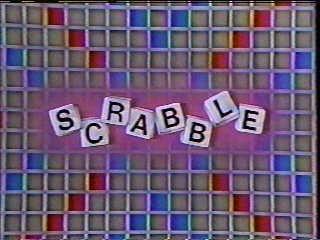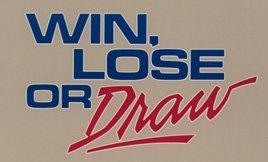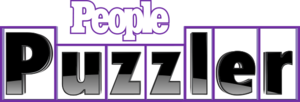
Scrabble is an American television game show based upon the Scrabble board game. Muriel Green of Exposure Unlimited developed the idea for a television game show based upon the board game concept. During 1983, Green convinced Selchow and Righter, who at that time owned the Scrabble board game, to license Exposure Unlimited to produce the game show. Exposure Unlimited co-produced the show with Reg Grundy Productions, and licensed the show to NBC. Scrabble aired on NBC from July 2, 1984, to March 23, 1990, and again from January 18 to June 11, 1993. Chuck Woolery hosted the program. Jay Stewart was the announcer for the first year. Charlie Tuna replaced him in the summer of 1985 and remained through the original run and the entirety of the 1993 revival.

Password is an American television game show in which two teams, each composed of a celebrity player and a contestant, attempt to convey mystery words to each other using only single-word clues, in order to win cash prizes.

Win, Lose or Draw is an American television game show that aired from 1987 to 1990 in syndication and on NBC. It was taped at CBS Television City, often in Studios 31, 33, and 43 at various times. It was co-produced by Burt & Bert Productions and Kline & Friends for Disney's Buena Vista Television. It has also had two versions on The Disney Channel: Teen Win, Lose or Draw from 1989 to 1992, and a revived version known as Disney's Win, Lose or Draw which aired in 2014. New York described Win, Lose or Draw as "a knockoff" of the board game Pictionary.
The Joker's Wild is an American television game show that aired at different times between 1972 and 2019. In the show, contestants answer questions based on categories determined randomly by a mechanism resembling a slot machine. The show's title refers to the game's slot-machine mechanism also having jokers.
Monopoly is an American television game show based on the board game of the same name. The format was created by Merv Griffin and produced by his production company, Merv Griffin Enterprises.

Chain Reaction is an American television game show created by Bob Stewart, in which players compete to form chains composed of two-word phrases.

The Cross-Wits is an American syndicated game show which premiered on December 15, 1975, and lasted for five seasons until its cancellation on September 12, 1980. The show was hosted by Jack Clark, with Jerri Fiala as hostess. Announcing duties were handled by John Harlan, Jay Stewart, and Jerry Bishop. The show was produced by Ralph Edwards Productions and distributed by Metromedia Producers Corporation.

Body Language is an American game show produced by Mark Goodson Productions. The show aired on CBS from June 4, 1984, until January 3, 1986, and was hosted by Tom Kennedy. Johnny Olson announced until his death in October 1985; Gene Wood and Bob Hilton shared the announcing duties afterward, having substituted on occasion before then.
BrainTeaser was a British game show based on the original Dutch format of Puzzeltijd. The show was broadcast live, with phone-in viewer puzzles being announced and played during the show in addition to the studio game. During its run from 5 August 2002 to 7 March 2007, it aired on Five Mondays to Fridays, usually for an hour around lunchtime, and was fronted by various presenters rotating with one another. Beginning in August 2005, a version of the show that exclusively focused on viewer participation was broadcast in a four-hour long block on YooPlay TV every day after the Five broadcast, as part of a thirteen-week trial.

Headline Chasers is a syndicated game show that ran daily from September 9, 1985, to May 23, 1986, with reruns airing until September 5. The series was hosted by Wink Martindale, who also created the series and was its executive producer, with Johnny Gilbert serving as announcer. The show was a co-production of Wink Martindale Enterprises and Merv Griffin Enterprises with King World Productions, Griffin's partner for his other syndicated game show offerings, as distributor. Headline Chasers was recorded at TAV Celebrity Theater in Hollywood, the same studio which housed The Merv Griffin Show.
Crosswits is a British game show produced by Tyne Tees in association with Cove Productions and Action Time, and filmed from Tyne Tees' City Road studios in Newcastle upon Tyne. First shown on 3 September 1985, it was originally hosted by Barry Cryer for the first two series; comedian Tom O'Connor then took over from series 3 until the show ended on 23 December 1998. The show consisted of two members of the public competing against each other to solve simple crossword puzzles. A "celebrity" partner helped each member of the public. The announcers for the show were generally Tyne Tees continuity announcers such as Judi Lines, Jonathan Morrell and Bill Steel.
Inside the Box is a Canadian television game show which debuted on September 18, 2006, on the cable network TVtropolis, and was syndicated in the United States by Program Partners in the 2008 television season. In the show, three contestants compete for a chance to win up to CA$10,000 by trying to guess television shows, characters, or actors by asking the other contestants either yes or no questions related to the subject. The show ran for two seasons, ending on December 7, 2007.
Temptation: The New Sale of the Century is an American syndicated television game show loosely based on both the original Australian and American Sale of the Century versions, plus the 2005 Australian version, also titled Temptation. The show began airing in syndication on September 10, 2007, with the last first-run episode airing on May 23, 2008. Reruns continued until September 5, 2008.
Brain Battle was a Canadian interactive game show, which aired weekdays on Global. The show premiered on March 26, 2007, and aired a total of 356 episodes as of its series finale on August 4, 2008.
Camouflage is a television game show that aired on Game Show Network. Hosted by Roger Lodge, and billed as "the hidden word game where the answer is always right in front of you", Camouflage originally aired for 40 episodes from July 2 to 27, 2007. The show is a word game, with contestants searching for a hidden word or phrase in a string of jumbled letters. The show is produced by Enjoy the Ride Productions in association with McB Entertainment.

Wheel of Fortune is an American television game show created by Merv Griffin. The show has aired continuously since January 1975. It features a competition in which contestants solve word puzzles, similar to those in hangman, to win cash and prizes determined by spinning a giant carnival wheel. The current version of the series, which airs in nightly syndication, premiered on September 19, 1983. It stars Pat Sajak and Vanna White as hosts, who have hosted the nighttime version since its inception. The original version of Wheel was a network daytime series that ran on NBC from January 6, 1975, to June 30, 1989, and subsequently aired on CBS from July 17, 1989, to January 11, 1991; it returned to NBC on January 14, 1991, and was cancelled that year, ending on September 20, 1991.
Jeopardy! is an American television game show created by Merv Griffin. The show is a quiz competition that reverses the traditional question-and-answer format of many quiz shows. Rather than being given questions, contestants are instead given general knowledge clues in the form of answers and they must identify the person, place, thing, or idea that the clue describes, phrasing each response in the form of a question.
Download is an Australian children's game show which aired on the Nine Network from 2000 until 2002. Scott McRae hosted the show in 2000-2001; he was replaced by Nathan Lloyd in 2001-2002, while Emily Jade O'Keefe hosted the final season of the show. The co-host for the final season was Miss Bytes.

Ask Me Another is an hour-long radio puzzle game show that was produced by WNYC and National Public Radio. It was hosted by Canadian American comedian Ophira Eisenberg and featured as its "in-house musician" or "one-man house band" independent rock musician Jonathan Coulton. Episodes of the show were usually recorded at The Bell House in Brooklyn, New York, however the show did go to various states across the country and recorded one or more episodes from those locations. The show was produced by WNYC Studios. During the COVID-19 pandemic in the United States, the show continued taping episodes from the homes of the participants, without a studio audience.

People Puzzler is an American television game show hosted by Leah Remini and broadcast by Game Show Network. It premiered on January 18, 2021. The show is inspired by the celebrity and pop-culture themed crosswords in People magazine.










